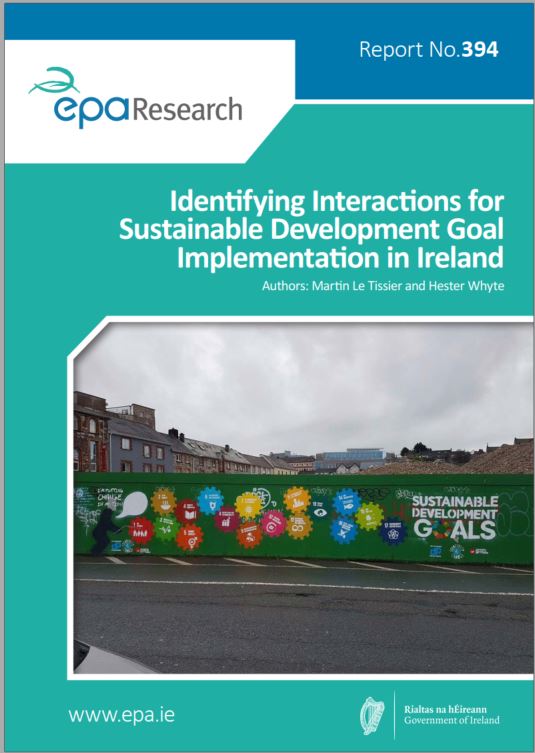Research 394: Identifying Interactions for Sustainable Development Goal Implementation in Ireland
Authors: Martin Le Tissier and Hester Whyte
Summary: This report addresses how understanding of interlinkages between the Sustainable Development Goals (SDGs) of the United Nations Agenda 2030 and Ireland’s policy portfolio can advance understanding to meeting SDG targets and a “whole-of-government” approach to policy implementation.

Project Highlights
Watch the project highlights video
In partnership with the International Science Council and the European Commission – Joint Research Centre, the project designed an online toolkit to assist policymakers and other stakeholders exploring the SDGs and policy interactions to design and implement evidence-informed policy.
Identifying Pressures
The SDGs require a step change in the integration of national social, economic and environmental policy in Ireland. SDG target 17.14 to “enhance policy coherence for sustainable development” reflects the reality that transforming societies and realising the SDGs is a multidimensional challenge; it entails harnessing synergies and managing trade-offs and policy conflicts. The individual targets of the SDGS are indivisibly interlinked, which is equally reflected in the intertwined nature of policy interactions. This can mean that action in one policy area can lead to unintended outcomes in other areas if they are pursued separately. Working towards the SDGs provides an opportunity for governments to consider how an understanding of how SDG targets are interlinked can be used to break out of policy silos and to identify, understand and manage policy interactions and interconnections.
Informing Policy
The novelty of the SDGs comes with the challenge of interpreting them in the national context and implementing them in an integrated and cross-cutting manner, which calls for revisiting the way organisations work and the way data and information are integrated. This challenge requires organisations to change from working in a “silo” or purely sectoral approach, and to work across sectors instead. Enabling this cross-sectoral approach is notoriously difficult and has been identified as a potential issue for Ireland. However, understanding the linkages across and between SDGs can lead to adjusted structures and decision-making processes to effectively integrate SDGs into the mandate of existing institutions and foster an administrative culture that promotes cross-sectoral collaboration sensitive to the need for global action. Such integration and transformations will have implications for other cross-government activities, such as climate change adaptation, by enabling approaches that lead to transformations towards resilient societies.
Developing Solutions
The SDGs provide a valuable tool for policymakers to use the nature of interactions between SDGs and targets – both positive and negative – to plan and drive coherent and efficient policy design and implementation. This project, “Identifying Interactions for Sustainable Development Goal Implementation in Ireland”, adopted an analytical approach to identify how interlinkages between SDG targets could be used to identify key intersections of policy domains in Ireland. This understanding was used to provide an online toolkit allowing policymakers to engage across policy domains to better use evidence-informed approaches to address the multiple challenges they face. In this way, the SDGs can be more than a reporting framework; they can also provide an action framework that leads to greater policy coherency. This, in turn, can lead to not only developing alignment of national policy with the SDGs, but also identifying opportunities for policy coherence in the context of national planning and development initiatives, such as Project Ireland 2040.
https://www.epa.ie/media/epa-2020/research/epa-funded-research/Report-cover-394.jpg